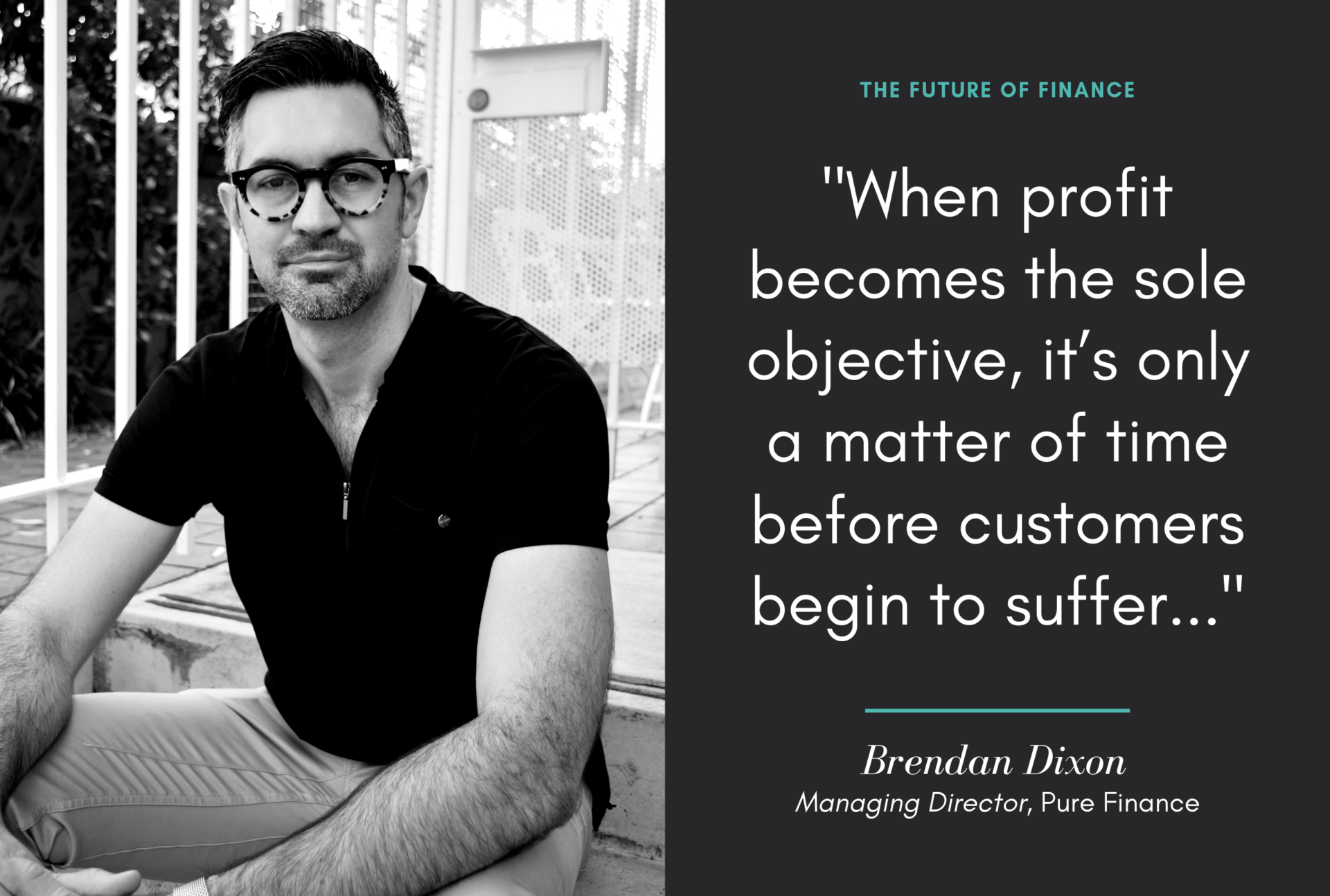There is no doubt that for Australia’s financial services industry, 2018 was a problematic year.
Most notably, as revealed in its final report released this week, the Hayne Royal Commission into the Banking, Superannuation and Financial Services Industries uncovered numerous counts of predatory misconduct at the hands of the big banks and shed a light on a toxic ‘bonus-culture’ that had permeated right through to upper management and executive levels.
Some customers were charged fees for ‘no service’. Some were continuing to be charged fees even after they had died. In some cases, it was found that the bank employees had engaged in ‘criminal behaviour’ with speculated jail time on the horizon for those involved.
Whilst the numerous counts of negligence and known misconduct uncovered as a result of the commission were undeniably grim, they were also ultimately, unsurprising. For years, Australia’s ‘big banks’ have been known to employ less than reputable operating standards in their interminable pursuit of profit. It was, and remains, one of the biggest motives for the creation of ‘Pure Finance’ way back in the March of 2011.
It was, and still is, our mission to model the change that we felt was desperately needed in an industry that had its priorities critically out of alignment with a customer’s best interests, and when it was announced that the Royal Commission would go ahead, we welcomed the news.
We, like so many Australians, saw it as a chance for the years of bad behaviour by the banks to finally be punished, and for those who were personally responsible to be held publicly accountable. We saw a chance for drastic systemic and cultural change to be championed by policy makers, in a landscape that was time and again shown to be ethically and morally bankrupt. The outcome we got falls devastatingly short.
So, how did we get here?
In his interim report released in September last year, Commissioner Kenneth Hayne put it succinctly thus:
‘Why did it happen? Too often, the answer seems to be greed – the pursuit of short-term profit at the expense of basic standards of honesty… ‘
In terms of an excuse, It’s abhorrent in the extreme. Worse still, at the time of writing, Australia’s major banks enjoyed a $20 billion gain on the share market, after the Commission’s final report left out any recommendations for radical structural reform, with the focus instead turning to mortgage broker remuneration. Coincidentally (or not) this outcome will deliver an additional $3.4 billion in revenue back to the banks, which, given that estimated bank remediation costs will only be in the vicinity of $850 million, it’s almost as if the banks have been rewarded for their misconduct.
If we’re honest, it’s a disappointing outcome. The diagnosis of an ingrained ‘culture gone bad’ but little to no recourse for those personally responsible, nor any tactical recommendations for a cure.
However, rather than retreat into inaction we are galvanised by the task ahead. It is more critical now than ever before, that we are unrelenting in our fight for an ethical and sustainable industry that WILL learn from its mistakes and do what is necessary to bring about critical action and reform.
A new financial future
What we have before us, is an opportunity. An opportunity to write ourselves a new future for the financial services industry. One that would not only seek to better the lives of the customers, but to also be accountable for the wellbeing of the communities and environments in which it resides.
This is a course of action that the entire finance industry can implement, of its own accord, immediately. It doesn’t need a green light from government, nor a heavy-handed royal commission report to beat it into submission. It must be fervently pursued, and willingly. If those at executive levels are indeed as serious about reform as they say, then let it be demonstrated in a self-orchestrated overhaul of the very foundations of their respective corporations.
Pie in the sky stuff? We disagree. Not only is our business (a ‘finance’ business) built upon the above foundations, but there is even proof that it works better. It works better for customers, for employees and yes, even profits.

New priorities = new outcomes…
Each year via a global survey, Deloitte asks millennials for their opinions on economic and political trends in the countries they inhabit, and also attempt to gauge optimism about respondents’ personal prospects in light of their social views.
In 2018, they found that millennials are feeling uneasy about the future.
They feel pessimistic about the prospects for political and social progress, along with concerns about social equality and environmental sustainability, and they yearn for business leaders whose decisions will benefit the world—as well as their careers.
In its entirety, the survey makes for some pretty compelling reading, but here a few key takeaways:
- There continues to be a stark mismatch between what millennials believe responsible businesses should achieve and what they perceive businesses’ actual priorities to be.
- 4 in 10 respondents see business leaders having a negative impact.
- Across mature economies as a whole, 67 percent of millennials agree with the statement that businesses “have no ambition beyond wanting to make money.”
- Only a minority now believes that corporations behave ethically (48 percent versus 65 percent in 2017) and that business leaders are committed to helping improve society (47 percent versus 62 percent).
- 83 percent of millennials overwhelmingly feel that business success should be measured in terms of more than financial performance.
So, let’s repeat that last point one more time for the people in the back (i.e. the banks): 83 percent of millennials overwhelmingly feel that business success should be measured in terms of more than financial performance.
And millennials aren’t alone.
Globally, an intergenerational push for companies to engage in socially conscious, ethical business practice is rapidly gaining momentum, and for those with their eyes open, it is abundantly clear that the age of unconscious capitalism is over. As this Royal Commission has so perfectly highlighted, and indeed all the inquiries that have come before (because we have, of course, been here before) it is imperative that the entire finance industry pioneers a shift in culture that will uncompromisingly put customers at its core.
It will undoubtedly be a herculean task to undo the decades of bad habits, and unfortunately, it seems those with the power to bring about change have once again shied away from any hard-hitting plans to tackle it.
So, here are our own recommendations for the big 4, to help get things started…
Putting people before profit
When businesses create an environment that seeks to prioritise profits, they ultimately generate a culture that will de-prioritise customers. One of the most pervasive problems uncovered by the Royal Commission were cases of misconduct where ‘sales targets’ were profitably incentivised in the form of bonuses, which in turn led to numerous instances of banks putting profits before the needs of their customers. On some occasions, before the law.
‘When profits become the sole objective, it’s only a matter of time before customers begin to suffer’ says Pure Finance’s managing director, Brendan Dixon.
‘A fundamental part of any successful, sustainable business is ensuring that its purpose is clearly defined, and that all actions undertaken by that business are aligned to, and not at odds with, that purpose’.
‘If the underlying objective is to make money, then they need to go back to the drawing board. Profit is an effect, not a cause.’
At the risk of sounding too naive, we understand that profit is undeniably an important aspect of a viable and healthy finance industry. But we fundamentally reject the idea that profit can only come from an unethical climate. It is both short-sighted and unsustainable and is possibly the biggest underlying issue uncovered by the Royal Commission, with little recommendation given to tackle it in an effective and far-reaching way.
Ethical, sustainable investment
In 2015, 174 countries and the European Union signed the landmark Paris agreement, whose central aim was to strengthen the global response to the now critical threat of climate change by working towards a global temperature target of 2 degrees Celsius above pre-industrial levels. Australia was one of these countries.
Since making this commitment, Australia’s big banks have provided a combined $21 billion to the fossil fuel industry, enabling around 7.4 billion tonnes of CO2 emissions.
Even if the banks don’t care to notice, Australians are making it clear that ethical investment is the way of the future and are demanding more accountability and transparency from their investments, in particular, from their superannuation. And the results speak for themselves.
In a 2018 Responsible Investment Benchmark Report, the RIAA (Responsible Investment Association Australasia) found that over the past 10 years, the average responsibly invested share fund returned 6.3 per cent a year, compared with the 3.8 per cent annual return for the average large-cap Australian Share fund.
Get woke, go broke? Apparently not.

Social impact
The results are well and truly in, and a commitment from businesses to measuring and bettering their social impact is becoming increasingly important to consumers.
And while Corporate Social Responsibility (CSR) isn’t necessarily a new idea, it is important that companies engage it in a way that is holistic and transparent. Whilst Australia’s big banks are often very vocal about their philanthropic pursuits, they tend to fall short on their ability to do so in a way that satisfies transparently.
Off the back of a less than favourable reputational outlook brought about by Royal Commission findings, the banks spent millions of dollars on marketing their social impact initiatives in 2018, which ironically, they could have avoided by putting a stop to misconduct in the first place. Even more frustratingly, those millions of dollars would have been far better spent on the initiatives themselves.
‘It’s important that businesses don’t use social impact as a way of offsetting bad behaviour’ says Brendan Dixon ‘or, as a way to fix some bad PR’.
‘For Pure Finance, our donation model Pure Community forms an indivisible part of our service offering and is managed alongside our day to day operations’.
‘I don’t think it's feasible for a business that claims it is socially responsible to make donations to certain parts of the community, whilst simultaneously defrauding others’ he says.
And now, an idea. In 2018, the major banks reported an after-tax profit of $29.5 billion for the full year. If they were each to adopt a 1% ‘profit for purpose’ donation model (Pure Community donates 10% of Pure Finance’s company profit) it would equate to an incredible $295 million that could facilitate incredible outcomes for communities in both Australia, and the world.
Diversity + Equality
A topic that has been left almost completely untouched in Royal Commission conversation, but is, in our opinion, a crucial element for industry reform, is that of diversity and equality in the financial services sector.
Whilst Australia has made significant progress in gender equality in the workplace, most experts agree that there is still a way to go and that progress can (and should) be faster. Women continue to earn less than men, are less likely to advance their careers as far as men and accumulate less retirement or superannuation savings. In the finance industry, women are hugely underrepresented at an executive level, with only 15% of high-level positions held by women, compared to 85% held by men.
‘In our view, gender equality is an extremely important conversation and we believe it has a significant role to play in creating the cultural change we seek in financial services’ says Brendan Dixon.
‘Businesses that are diverse, both in gender and culture, have a greater ability to connect with their customer base and deliver better outcomes across the board, including productivity’ he says.
If the fact that ‘it’s just the right thing to do’ doesn’t inspire the banks, then how about these stats from the Workplace Gender Equality Agency (WGEA). The agency found that workplace gender equality is also associated with:
- Improved national productivity and economic growth
- Increased organisational performance
- Enhanced ability of companies to attract talent and retain employees
- Enhanced organisational reputation
In the interest of keeping things topical, a 2018 report by McKinsey also found that Australia could expect to add $225 billion to its GDP (an increase of 12%), just by implementing greater gender equality measures. So, what are the banks waiting for???
Where to from here?
The events of the last week, with reference to those surrounding the outcome from the Hayne Royal Commission, have been discouraging. What we hoped would be an opportunity for monumental structural and cultural reform, has instead given way to an outcome that we feel is lacking in any substantial recourse. It feels like it will right back to ‘business as usual’ in bank land before too long.
Though rather than be bullied by the powers that be, we are putting our future in our own hands and as always, we aim to lead by example. Whilst the nature of a bank is to make money, it cannot and must not do so in a way that only holds benefit for itself. This will be the challenge moving forward and it is our unequivocal belief that businesses such as ours, the SME’s and the one-man-bands, will encompass a crucial part in the success of these endeavours.
It is particularly important to us that we express to you, our customers and partners, that our desire to provide a service that places its customers and community at the heart of its pursuits will never waver. That our purpose is to provide an option for those that the banking system doesn’t effectively help and to continue making the great Australian dream of home ownership a more accessible and ethical one. For everybody.
We welcome any questions or feedback on the above, and you can contact us at any time via: info@nullpurefinance.com.au
If you’d like to know more about Pure Finance, you can find it here. Similarly, you can learn more about our donation model, Pure Community, here.
